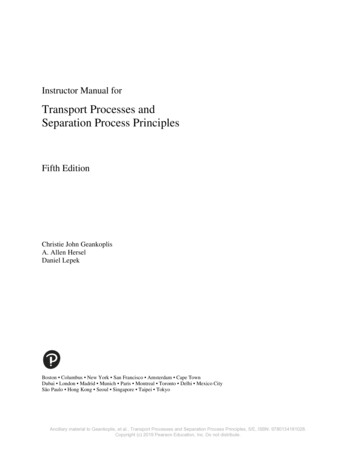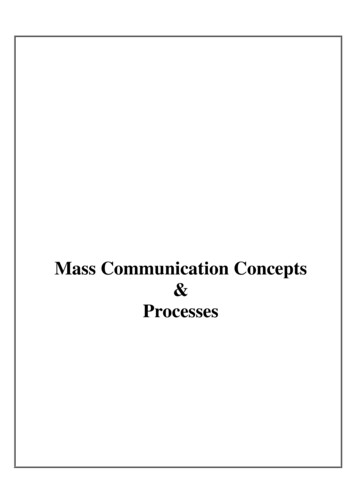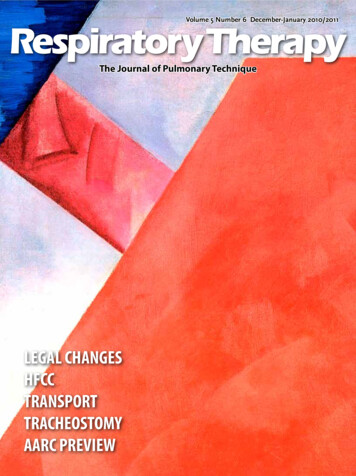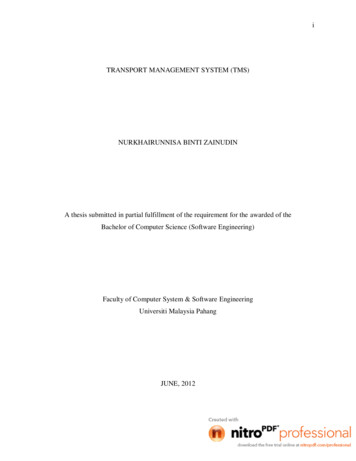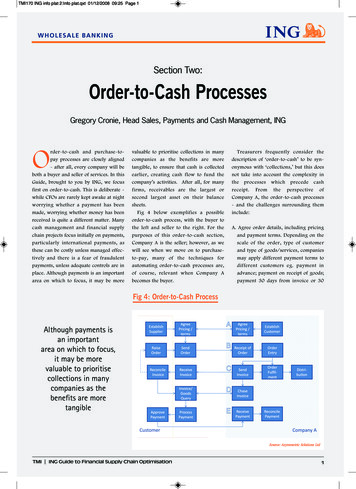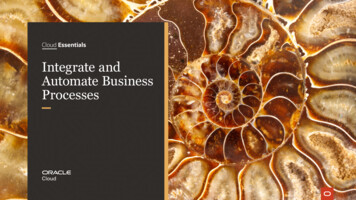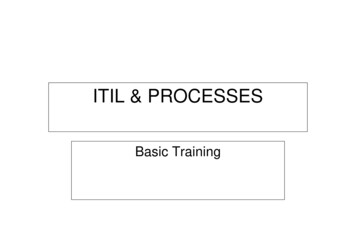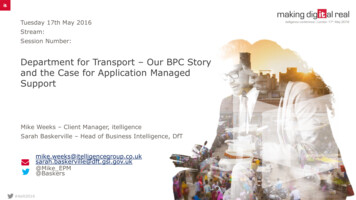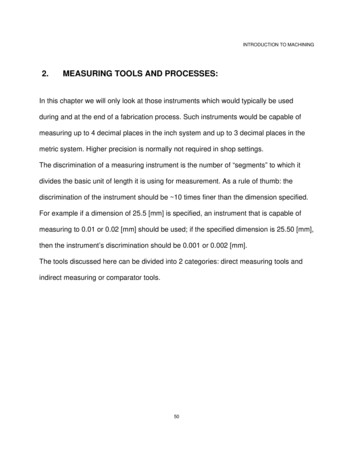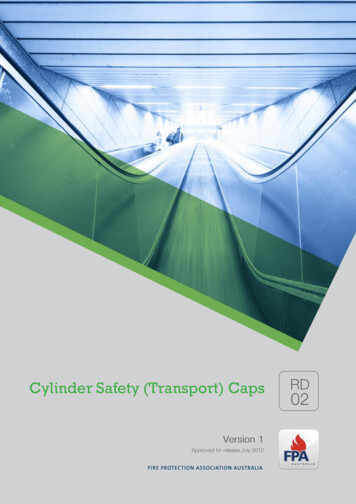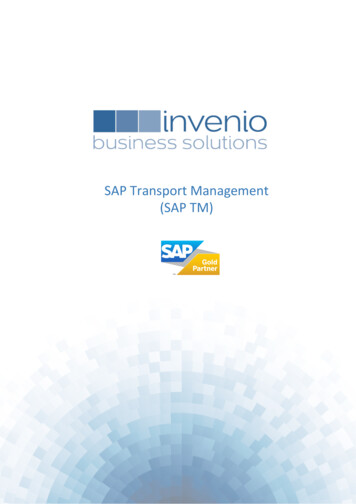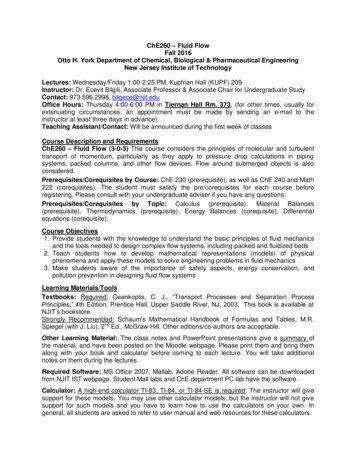
Transcription
ChE260 – Fluid FlowFall 2016Otto H. York Department of Chemical, Biological & Pharmaceutical EngineeringNew Jersey Institute of TechnologyLectures: Wednesday/Friday 1:00-2:25 PM, Kupfrian Hall (KUPF) 209Instructor: Dr. Ecevit Bilgili, Associate Professor & Associate Chair for Undergraduate StudyContact: 973.596.2998, bilgece@njit.eduOffice Hours: Thursday 4:00-6:00 PM in Tiernan Hall Rm. 373, (for other times, usually forextenuating circumstances, an appointment must be made by sending an e-mail to theinstructor at least three days in advance)Teaching Assistant/Contact: Will be announced during the first week of classesCourse Description and RequirementsChE260 – Fluid Flow (3-0-3) This course considers the principles of molecular and turbulenttransport of momentum, particularly as they apply to pressure drop calculations in pipingsystems, packed columns, and other flow devices. Flow around submerged objects is alsoconsidered.Prerequisites/Corequisites by Course: ChE 230 (prerequisite), as well as ChE 240 and Math222 (corequisites). The student must satisfy the pre/corequisites for each course beforeregistering. Please consult with your undergraduate adviser if you have any questions.Prerequisites/Corequisites by Topic: Calculus (prerequisite), Material Balances(prerequisite), Thermodynamics (prerequisite), Energy Balances (corequisite), Differentialequations (corequisite).Course Objectives1. Provide students with the knowledge to understand the basic principles of fluid mechanicsand the tools needed to design complex flow systems, including packed and fluidized beds2. Teach students how to develop mathematical representations (models) of physicalphenomena and apply these models to solve engineering problems in fluid mechanics3. Make students aware of the importance of safety aspects, energy conservation, andpollution prevention in designing fluid flow systemsLearning Materials/ToolsTextbooks: Required: Geankoplis, C. J., “Transport Processes and Separation ProcessPrinciples,” 4th Edition, Prentice Hall, Upper Saddle River, NJ, 2003. This book is available atNJIT’s bookstore.Strongly Recommended: Schaum's Mathematical Handbook of Formulas and Tables, M.R.Spiegel (with J. Liu), 2 nd Ed., McGraw-Hill. Other editions/co-authors are acceptable.Other Learning Material: The class notes and PowerPoint presentations give a summary ofthe material, and have been posted on the Moodle webpage. Please print them and bring themalong with your book and calculator before coming to each lecture. You will take additionalnotes on them during the lectures.Required Software: MS Office 2007, Matlab, Adobe Reader. All software can be downloadedfrom NJIT IST webpage. Student Mall labs and ChE department PC lab have the software.Calculator: A high-end calculator TI-83, TI-84, or TI-84-SE is required. The instructor will givesupport for these models. You may use other calculator models, but the instructor will not givesupport for such models and you have to learn how to use the calculators on your own. Ingeneral, all students are asked to refer to user manual and web resources for these calculators.
Course OutlineWeekTopic1Introduction, Fluids, Fluid Statics, Pressure, Differential (Shell) Momentum Balanceon Static Fluids, Manometry, HeadMolecular Transport, Newton’s Law of Viscosity, Shear Viscosity, Non-NewtonianFluids, Gradients, Introduction to Laminar and Turbulent Flow, Reynolds NumberMacroscopic Mass–Energy Balances, Continuity Equation, Mechanical EnergyBalance, Bernoulli equation, Friction Losses in Mechanical Energy BalanceExam #1Momentum Balance in Cylindrical Shell, Hagen-Poiseulle Equation, MomentumBalance in Falling Film, Navier-Stokes Equation, Velocity Distribution in Laminar andTurbulent Flow, Entry LengthDesign Equations for Laminar and Turbulent Flow in Pipes, Friction Factor,Mechanical Energy Losses in Pipes and FittingsExam #2Pumps and CompressorsMeasurement of Flow, Venturi, Orifices, Pitot TubeMacroscopic Momentum Balance, Forces on PipesFlow Past Immersed ObjectsFlow in Packed BedsFinal Exam23–456–8910111213Important: It is conceivable that some changes in the above outline will take place, depending on theoverall performance of the class and on the time actually required to cover the most important subjects.Assessment/GradingQuiz/HW — 15%, Exam #1 — 25%; Exam #2 — 25%; Final Exam — 35%Quiz/HW Assignments: Quizzes will NOT be announced. Only select HW will be graded. Onceassigned, a HW is due the following week during class time unless otherwise indicated. Pleaseuse instructor’s office hours for HW related questions as well as other questions/inquiries.Student performance will be evaluated on an absolute scale and not relative to the performanceof other students in class. Final letter grades will be awarded based on your weighted averagescore (see weighting above) and a table of average score–letter grade categories. Thesecategories will be communicated via Moodle. Attendance may affect your final grade asdescribed under Policies/Norms.Important Dates (***Please mark on your calendar, see Timetable document for details***)Exam # 1 — Oct. 05; Exam # 2 — Nov. 04, Final Exam — Dec. 16-22, Day TBD by registrarCancelled Lectures — Nov. 16 & 18 (AIChE Mtg.), Nov. 25 (Thanksgiving Recess)Make-up Lectures — Nov. 19 (Sat., KUPF209, 10:00 AM-1:00 PM) and Dec. 03 (Sat.,KUPF209, 10:00 AM-11:30 AM). At the beginning of the semester, students are required toinform the instructor if and only if they take a course on Sat. that has a time conflict with themake-up lectures. Make-up lectures for class cancellations due to inclement weather will becommunicated separately.Last Day to Withdraw — Nov. 07 (M), no special permission to withdraw thereafter.Reading Day — Dec. 152
Policies, Norms, and ExpectationsAcademic integrity/honesty is of paramount importance. The NJIT Honor Code will beupheld. Violations will be brought to the immediate attention of the Dean of Students.Rules and Expectations during the Lectures/Course Students are strongly recommended to attend ALL lectures. Attendance sheet must besigned at the beginning of the lecture; otherwise, the student is considered absent.Excluding immediately accountable, extenuating circumstances, more than 2 absencesmay negatively affect the grade if the weighted score is border-line between grades.More than 4 absences may lower the final grade to the adjacent letter grade. Studentsmay get an F for more than 8 absences! Please come to the class before the lecture starts or at least ON TIME. Under nocircumstances, students should distract their peers and the lecturer. Students are responsible for all information given in lectures (oral, written or handouts,posted notes), whether they are present or not during the lectures. No cell phone/laptop use, no video/audio recording, and no eating any time during thelecture. Make sure to pair with another student(s) to join in-class group activities (few minuteseach). Students are expected to participate when asked by the instructor. Students are expected to behave, communicate, and interact with the instructor andpeers with respect and dignity as a candidate, professional chemical engineer. Expectations: ATTEND all lectures, ASK questions, PARTICIPATE in group activities,SHOW UP during official office hours, DO homework, REVIEW/WORK ON the materialof the previous lecture before next class, otherwise students will have difficulty tounderstand the lecture. Students are expected to MASTER the class/posted notes, takeadditional notes during the lectures, and read covered sections of Geankoplis. For success, students have to WORK OUT all derivations and examples in the notes ontheir own after each lecture. In case of questions, please see the instructor during OfficeHours or raise questions in the class. Do not delay this to the exam week.Rules, Policies and Expectations about Course Materials, E-mails & Office Hours The instructor encourages all students to show up during the official office hours.Students must make their best attempt to contact the instructor during these hours. Course notes, HW assignment, HW solutions, etc. have been (will be) posted on theMoodle webpage. Critical announcements will be made through that system as well. Youare required to visit the website on a daily basis to get recent homeworkassignments/solutions and other relevant announcements. Students are expected tobring the relevant notes, the book, and calculator to the class and to take additionalsupplementary notes in the class. E-mail is for quick questions, not for the solution of complex problems. Students are firstencouraged to check Moodle for information. Then, they should discuss the problemsamong their peers or study group. In the end, they are welcome to use the Office Hoursfully. If a student misses the Office Hours for a serious reason, he/she may want to setup an appointment via e-mail at least 3 days in advance for alternate time depending oninstructor’s availability at that time. Since the instructor cannot guarantee availability, it isbest for students to contact the instructor during the Office Hours. The instructor reserves the right not to respond to all e-mails. Improperly written e-mailswith lax attitude will not be replied. Also, e-mails will only be answered if it takes lessthan 5 min to respond and/or usefulness of the inquiry to the whole class. Instructororiginated information is communicated via e-mail or posted on Moodle (check daily).3
Policies and Expectations about Exams/Grades A letter grade is based on the weighted average score, a table of average score-lettergrade categories, and possibly the attendance record. Letter grade will be assignedautomatically by an Excel code (no emotions attached) in view of the attendance record.The assigned letter grade is FINAL without subject to negotiation! Students have to plan, study and do well in exams/HW if they want to get a good gradein this class. Instructor will NOT change letter grades to accommodate any specialcircumstances. The student will get the letter grade he/she deserves. Students can dispute the exam scores within a week following the announcement of thescore. Students cannot dispute their prior exams or HWs after one week or at the end ofthe semester! After first review of the dispute, if the score is not modified, but the studentis unconvinced and asks for an additional review, then he/she assumes the possibility ofinstructor reviewing the whole exam paper and removing points as well as giving points. Students may be asked to return their graded exam papers within a week. No extra credit will be allowed (no need to ask) under any circumstances. Exams are open notes and open books. Students are required to bring notes, therequired textbook, any other books on Fluid Mechanics, a Mathematics Handbookand/or comprehensive Advanced Mathematics/Diff. Eqs. Book(s), Math ReviewDocument, and a high-end calculator. No cell phones (to be turned off), Ipads, laptops, etc. can be used during the exam. Students have to write legibly while showing all work; otherwise, loss of points is likely. Iftwo solutions are given for a problem including the correct and incorrect ones, thestudent gets 0 points. Please erase or cross out the incorrect solution. Students get 0 for no-show to exams. Make-up exams (no make-up quizzes) may onlybe given under extreme circumstances (e.g., major close-family emergency, seriousaccident or acute medical problem) at the sole discretion of the instructor. Students bearthe responsibility of due proof and documentation to the Dean of Students. It is thestudent’s responsibility to inform the instructor and Dean of Students ASAP. Read the Study Guide to be posted before each exam and attend the Review Session (ifthere is one). Some exam questions can be of multiple-choice type or of assay typerequiring verbal explanations, while others will be derivation type with symbolicmanipulation or pure calculation type requiring calculators. Show all work, otherwise no partial credit means you cannot simply skip importantintermediate steps during a calculation/derivation. You will lose significant points even ifthe final answer is correct.Policies and Expectations about Homework Only select HW will be graded. Once assigned, a HW is due the following week duringclass time unless otherwise indicated. Solved problem sets have already been posted. You are strongly recommended to goover these solved problems as they will help you to solve HW problems that will beposted during the semester and prepare you for the Quiz/Exam. You are allowed todiscuss HW problems with peer students, but cannot copy or use the solution directly. Late assignments will get 0 independent of the circumstances. No electronic submissionaccepted. Make sure you submit the HW at the beginning of the lecture. If you come lateto class, do NOT attempt to submit the HW and interrupt the lecture, rather submit HWat the end of the lecture outside the classroom. Please do NOT put HW in my mailbox. Homework and exam papers must be written legibly in an organized, structured fashion.Students are responsible for potential loss of points due to sloppy, unclear, or illegiblework on the papers.4
Expectations for the Use of Mathematics and Calculators Mathematics is the language of engineers and the course will rely on some backgroundin Calculus and Differential Equations. You are required to read the “Math Review”document and improve on the gap areas. Keep a Math Handbook such as Schaum’sMathematical Handbook handy for study and exams. While going through the coursematerial and solving quantitative and theoretical problems, try to relate to the math in the“Math Review” and Math Handbook. In exams, students are required to use high-end calculators for solution of a non-linearequation, linear regression, and spread-sheet calculations. There are examples thatmake use of TI-83-83-84 SE calculators in the cour
Textbooks: Required: Geankoplis, C. J., “Transport Processes and Separation Process Principles,” 4th Edition, Prentice Hall, Upper Saddle River, NJ, 2003. This book is available at NJIT’s bookstore. Strongly Recommended: Schaum's Mathematical Handbook of Formulas and Tables, M.R. Spiegel (with J. Liu), 2nd Ed., McGraw-Hill. Other editions/co-authors are acceptable.
